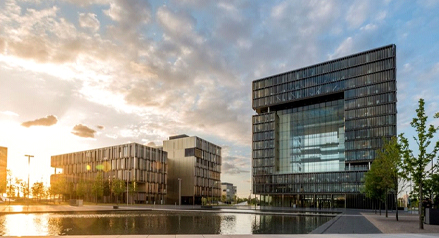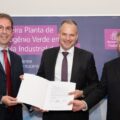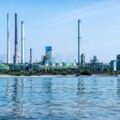ThyssenKrupp, a leader in green transformation, has created a new segment called Decarbon Technologies that features technologies essential to the shift to more sustainable energy sources. In addition, an improvement program is being implemented in all of the Group’s divisions.
The industrial and technology company thyssenkrupp is in the midst of a transformation process, reorganizing its portfolio and launching a performance-focused program across the Group called “APEX”. As of October 1, 2023, three key companies for the decarbonization of the industry – thyssenkrupp rothe erde (Bearings business unit), thyssenkrupp nucera and Uhde and Polysius – will be merged into a new segment called Decarbon Technologies. These plans were approved by the Supervisory Board of ThyssenKrupp AG at its previous meeting.
With the implementation of this new section, ThyssenKrupp establishes itself in a prominent position as a technology leader for the shift to more sustainable energies and highlights its comprehensive capabilities for the transition to a greener model.
At the same time as reorganizing its portfolio, ThyssenKrupp has initiated the “APEX” program to achieve its financial targets set during the Capital Markets Day in December 2021. Despite the constantly challenging environment, the company is targeting an adjusted EBIT margin of 4 to 6 percent at group level in the medium term, generating a significant amount of free cash flow before mergers and acquisitions, and providing stable and continuous dividends to its shareholders.
According to Miguel Lopez, CEO of thyssenkrupp AG, his company has world-leading technologies that help reduce a large part of today’s CO2 emissions. The objective is to maximize the potential of these businesses and translate it into value-based growth. To achieve this, the Decarbon Technologies segment, known as “green industrial power”, has been created. At the same time, through their performance program, they seek to improve profitability and make the most of market opportunities. These two aspects are essential for success, just like on a soccer field where you are looking to improve stability, speed and endurance in every business with the performance program and use Decarbon Technologies as a new offensive strategy.
Thyssenkrupp is focusing its transformation on future themes and emerging technologies, aiming to take advantage of the great opportunities offered by the green transformation. This means that the Group has focused all its businesses in these areas in order to benefit as much as possible from these prospects. Decarbon Technologies brings together companies that possess core sustainable technologies.
In the future, the new Decarbon Technologies segment will employ approximately 15,000 people and generate sales of around €3 billion in fiscal 2021/2022. The segment headquarters will be located in Dortmund due to its proximity to business. Other locations in growth regions such as the Middle East are also being considered. It is planned to establish joint management through a Supervisory Board and a Business Committee. The CEO of thyssenkrupp AG, Miguel Lopez, will manage this segment.
Decarbon Technologies comprises the companies thyssenkrupp rothe erde, thyssenkrupp nucera, Uhde and Polysius, which have extensive international plant engineering experience, a broad customer base and close customer relationships.
Thyssenkrupp Rothe Erde is a world-leading manufacturer of advanced rolling bearings that is contributing to the shift to renewable energy. The global expansion of wind energy presents great growth opportunities for thyssenkrupp Rothe Erde in the future. In addition, the company is promoting green transformation through the use of its drives and slewing rings in solar and wind turbines. Recently, they have installed 1,000 multi-megawatt rotor bearings.
To produce green hydrogen, green electricity is necessary. An important company in this market is thyssenkrupp Nucera, which is engaged in the production of electrolysis plants. Following its successful IPO, thyssenkrupp AG plans to remain an anchor shareholder of thyssenkrupp Nucera and to take advantage of growth opportunities. With more than 600 completed projects, this company leads the market in the chlor-alkali sector and uses its expertise to develop and expand large-scale green hydrogen production through the electrolysis of alkaline water.
In perspective, green hydrogen production will take place mainly in areas with access to low-cost, renewable electricity. The ammonia will serve as a transport medium to carry the hydrogen to where it is needed. Uhde is a technology leader in the fields of cracking and production of ammonia, which will be increasingly produced by environmentally friendly methods in the future. Ammonia will therefore play an important role as a basic material for the chemical and fertilizer industry on its way to environmental sustainability. In addition, Uhde offers other technologies for the production of green chemicals.
Cement production, together with the steel and chemical industries, is an important factor in reducing CO2 emissions worldwide. Polysius stands out as one of the leaders in environmentally friendly technologies, including patented oxyfuel plants, to help the cement industry achieve climate neutrality. As cement producers are under great pressure to reduce their CO2 emissions, the market potential is high. Today, Polysius has built about 35% of the world’s cement plants.
Along with the reorganization of its portfolio, ThyssenKrupp has presented a new holistic performance program that was discussed at a meeting of the Executive Committee and the Supervisory Board. The objective of this program is to ensure that companies achieve their financial goals established at Capital Markets Day in December 2021 in an effective and long-term manner. Although significant progress has already been made in improving operational performance as part of the transformation, the current environment is more challenging than anticipated at the end of last year. This is due to conflicts such as the war in Ukraine, problems in energy supply and high energy prices in Germany, as well as disruptions in supply chains and high inflation rates and significant increases in interest rates worldwide. The performance program aims to address these gaps and close them decisively.
The business improvement project is known as “APEX”, which stands for “apex”. In the near future, specialists in various industries will work together to find measures to improve management and performance in six key areas, including material costs. Companies will be responsible for implementing these measures and ensuring their success. ThyssenKrupp AG has created a “Transformation Office” to oversee the program and Cetin Nazikkol will be responsible as Chief Transformation Officer (CTO). Once the objectives and milestones of the program have been established, concrete actions will be developed and the implementation process will begin. There will be continuous monitoring of the program’s progress and any necessary adjustments under the direction of the executive board. This project, called “APEX”, will be connected to other existing initiatives to improve the company’s performance.
Thyssenkrupp also plans to focus on improving the performance of its business, in particular the Polysius and Uhde companies within the Decarbon Technologies segment. These companies have already successfully initiated a transition to “green” products and services and are implementing programs to improve their performance. The next step is to transform business models, including strategies such as modularization and standardization of products and expansion of cost-effective services. A successful example of this strategy is the chlor-alkali technology implemented by thyssenkrupp nucera, which makes it possible to produce large volumes of green hydrogen at low cost. In this way, thyssenkrupp nucera will facilitate large-scale production of this type of hydrogen for its customers, increasingly outsourcing costly construction and assembly tasks to external partners.
Thyssenkrupp’s leader, Miguel Lopez, explained that the “APEX” program allows them to maximize the potential of their core technology businesses in the long term. In particular, they focus on key technologies for the energy transition and aim to achieve a shift towards profitable and sustainable business models in line with thyssenkrupp nucera’s vision. By grouping these technologies under Decarbon Technologies, thyssenkrupp is leading the transformation to a greener future and ensuring its viability and that of its customers.







